

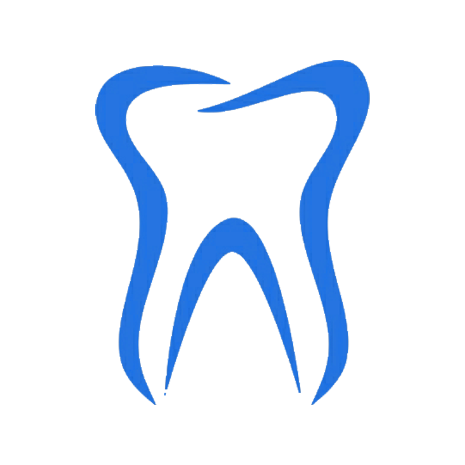
Dental Services |
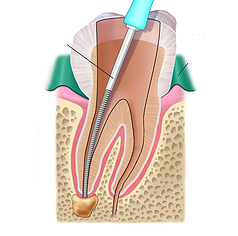 When is root canal treatment advised?
When is root canal treatment advised?
Toothache during chewing or during contact with any extreme hot or extreme cold which is usually tolerated.
Constant tooth pain during chewing
Change in color/Darkening of the tooth
Fracture of the tooth due to trauma
Swelling seen in the areas of gums around the tooth
How long does it take? Usually It is Completed in three Sittings but according to requirement can be done in single sitting too. What is a root canal treatment? In simple terms, root canal treatment is the removal of the infected soft tissue within the tooth and its replacement by an artificial inert 'filling' material. This procedure basically saves the tooth and eliminates dental pain. It prevents extraction of the tooth as would have been advised earlier.
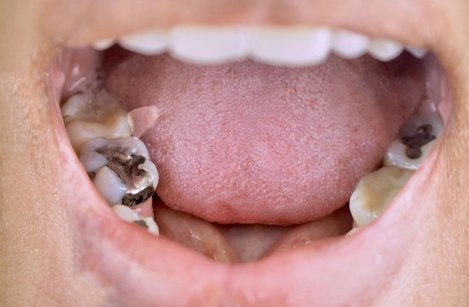 What is Tooth Decay or "Cavity"?
What is Tooth Decay or "Cavity"?
Tooth decay or cavity is a disease that destroys the structure of teeth. If left untreated, it can lead to pain and infection and in severe cases, tooth loss.
What causes tooth decay?
Bacteria in the mouth feeding on sugar from diet/food produce acids that destroy tooth structure creating a "hole" in the tooth, otherwise known as cavity. What is the treatment for tooth decay?
If detected at the earliest, tooth decay can be treated by simply filling the cavity with tooth color materials. If the decay is extensive causing pain or swelling, a root canal treatment is recommended.
What are the filling materials that are used?
The most commonly used dental filling materials are GlassIonomer Cement and composite (tooth color) materials.
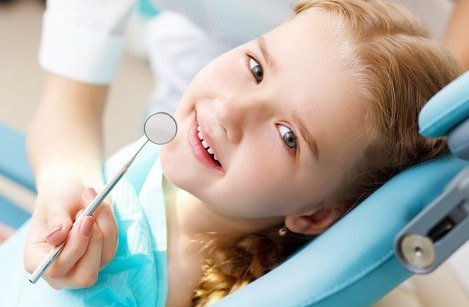 How can we prevent tooth decay in children?
Correct diet : Too much sugar as well as sticky food in the diet, and dental plaque on the teeth, is the main causes of tooth decay and gum disease.
How can we prevent tooth decay in children?
Correct diet : Too much sugar as well as sticky food in the diet, and dental plaque on the teeth, is the main causes of tooth decay and gum disease.
Oral hygiene and plaque control: It is important to maintain oral hygiene by brushing twice a day and rinsing after every meal.
Fluoride : Fluoride makes the teeth more resistant to decay and can also reverse initial decay process. Professional fluoride application can be done by the dentist in the form of gels or varnishes
Fissure sealants : They are thin composite materials that are placed in the fissures of a newly erupted permanent tooth. They aid in making the tooth surface more smooth and easy for maintenance.
When Should I Take My Child to the Dentist for the First Time?
Children should visit a dentist when their first tooth comes in or no later than their first birthday.
Why should baby teeth be filled or repaired?
Baby teeth that have decay should be restored to prevent the decay from spreading.
Baby teeth should be cared for as they serve the same important purposes as the permanent teeth.
Baby teeth should be kept in place until they are replaced by permanent teeth. They reserve the space for the permanent teeth to grow into.
If baby teeth are lost/extracted too early, the adjoining teeth can drift into the spaces that are needed for the permanent teeth. This can then cause crowding problems, because there is insufficient space for the permanent teeth.
Decayed teeth causing pain will also discourage the child from eating thereby affecting the general health also.
What is the importance of baby teeth?
Even though your child will one day lose his/her primary/milk teeth, it is important to care for them. The primary/milk teeth are essential for everyday function such as eating and speech development. Early childhood decay, is a preventable condition that causes painful teeth and gums. The primary teeth are also important to provide space for the larger adult teeth to erupt later.
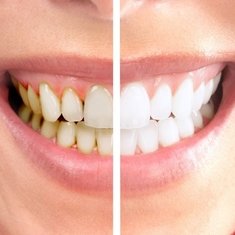 How long does it take?
How long does it take?
It takes around 15-20 minutes per sitting. Usually no more than 2-3 sittings are required.
How often should I see the dentist for cleaning?
Most children and adults should see their dentist for a regular cleaning and check up every six months.
Is cleaning harmful?
No. Professional cleaning does not harm the tooth structure.
What is polishing?
Polishing is done after cleaning to make the tooth surface smooth.
What is professional teeth cleaning?
Professional scaling involves the use of an ultrasonic scaler that removes bacterial plaque and tartar/calculus from the tooth surface.
Why should I get my teeth cleaned?
Deposits of tartar/calculus or plaque on your teeth, gums.
Bleeding from gums.
Bad breath.
These are the reasons for getting your teeth cleaned Will my teeth become loose after a cleaning? NO. Teeth do not become loose after a cleaning. Sometimes excessive accumulation of tartar/calculus itself holds the tooth in place. Upon removal of the tartar/calculus, teeth may feel loose, but this is actually due to loss of gum/bone.
 What's the extraction procedure?
What's the extraction procedure?
You'll be sedated (typically with intravenous anaesthetic). Once you're comfortable, the dentist administers a local anaesthetic. The surgery takes 20 to 30 minutes. Afterward, you'll spend time in the recovery room. Ask a family member or friend to take you home.
Recovery time depends on your age and the degree of tooth impaction; for younger patients, the swelling and discomfort may last three to five days. Your dental professional may prescribe pain medication.
Why might I need to have my wisdom teeth removed?
Often, wisdom teeth don't grow in properly. A tooth is "impacted" if it's prevented from reaching its normal position (say, by obstruction from tissue or another tooth). Impacted teeth can cause problems with chewing or periodontal problems and damage adjacent teeth. A tooth can be partially impacted—it has broken through the surface of the gums but can't grow into a normal position. Dentists can determine which teeth won't grow in properly.
Impacted wisdom teeth may hurt, and they can develop cavities, infections or periodontal disease. It's often when these problems arise (as well as during regular dental exams) that people realize they need to have their wisdom teeth extracted.
Some people never need surgery—their wisdom teeth grow into proper position / the teeth stay in the jawbone & don't cause problems. Others don't need surgery as young adults, but their wisdom teeth may cause problems later in life.
When should I have my wisdom teeth removed?
In general, it's best to have wisdom teeth taken out between ages 16 and 22. Like other teeth, wisdom teeth develop in the jawbone. The crown of each tooth is formed first, & it's pushed up when the root of the tooth develops. In young adults, "the formation of the root is not complete, so there are fewer complications & risks."
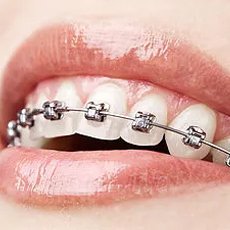 The results of orthodontic treatment can be dramatic — beautiful smiles, improved dental health and an enhanced quality of life for many people of all ages. Outstanding results are also dependent on maximizing the coordination of care between you and our experienced staff
The results of orthodontic treatment can be dramatic — beautiful smiles, improved dental health and an enhanced quality of life for many people of all ages. Outstanding results are also dependent on maximizing the coordination of care between you and our experienced staff
What are the Orthodontic Treatments provided?
Clear Braces : Metal brackets or braces can now be replaced with clear bracket or a bracket in a color of your choice. Clear braces makes wearing braces less noticeable.
Lingual or Internal Braces : Lingual or Internal Braces are attached to the inside or lingual side of the teeth which makes them completely non-visible. Lngual orthodontics particularly well-suited for adults whose professions keep them in the public eyes.
Invisalign : Invisalign uses a series of clear removable aligners to straighten your teeth without metal wires or brackets. This is also an invisible way to straighten your teeth without braces.
Ceramic dental braces have become all the rage for those who might "freak out" over the idea of metal dental braces. Commonly known as ceramic dental braces or tooth-colored dental braces, porcelain dental braces are one of several types of orthodontic braces designed to fit adult lifestyles. Porcelain dental braces help hide the fact you're wearing braces by blending in with your teeth. Unlike traditional metal braces, porcelain brackets are made from a glass-like composite material that appears translucent, allowing your teeth to shine through.
ClearPathAligner : ClearPath Aligners are USFDA APPROVED, removable medical grade plastic appliances which patient wears instead of brackets and wires to correct malocclusion. Dental aligners are a modern alternative to braces, for teeth that are in need of straightening.
A Clear change to the concept of Cosmetic and Adult Orthodontic treatment without using conventional methods of wires and brackets. Adults wouldn't have asked for a better choice to correct their malocclusion without social inhibitions.
ClearPath dental Aligners also offer predictable results visualization even before the treatmentClear Aligners are clear removable cosmetic appliance designed for minor teeth movement of patients.
Can these be removed?
You can remove ClearPath aligners to eat, drink, brush and floss or for special occasions.
What are Fixed Braces?
Fixed braces consist of brackets and bands bonded or cemented to your teeth (to get a hold of them), and very thin metal wires that gently push your teeth into their right positions. The wire is tied into the brackets with a steel ligature or a coloured plastic ring. Some brackets have clips to hold the wires and no ties are needed. Brackets can be made of metal or tooth-coloured ceramic or plastic. Ordinary fixed braces are bonded to the front of your teeth. There are also braces that can be bonded on the back of your teeth (lingual braces).
Designed by Seacom Digital